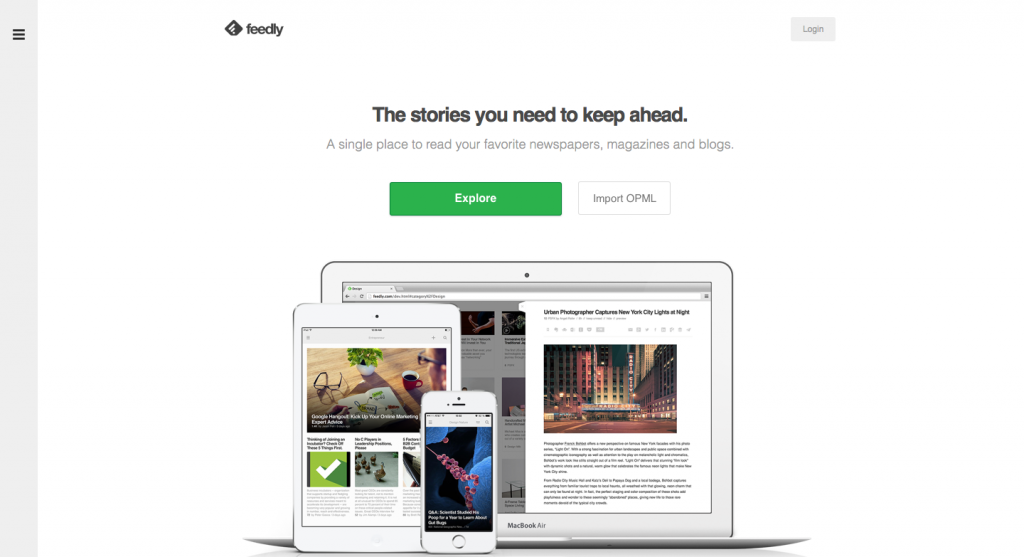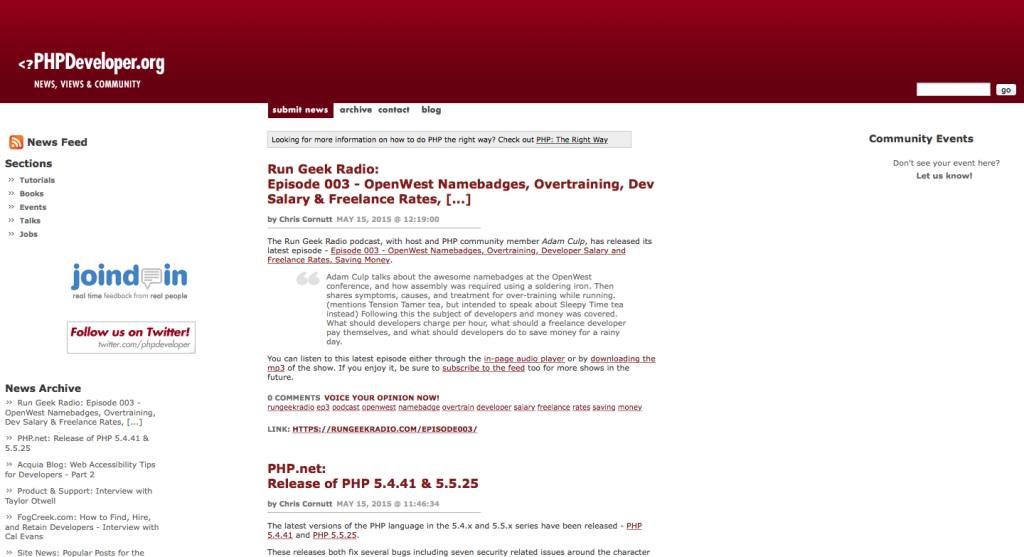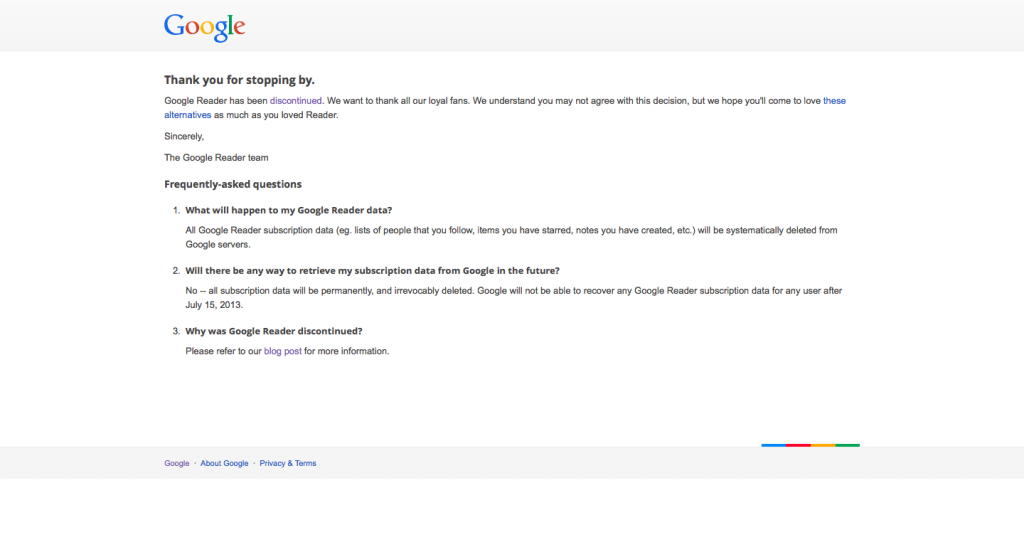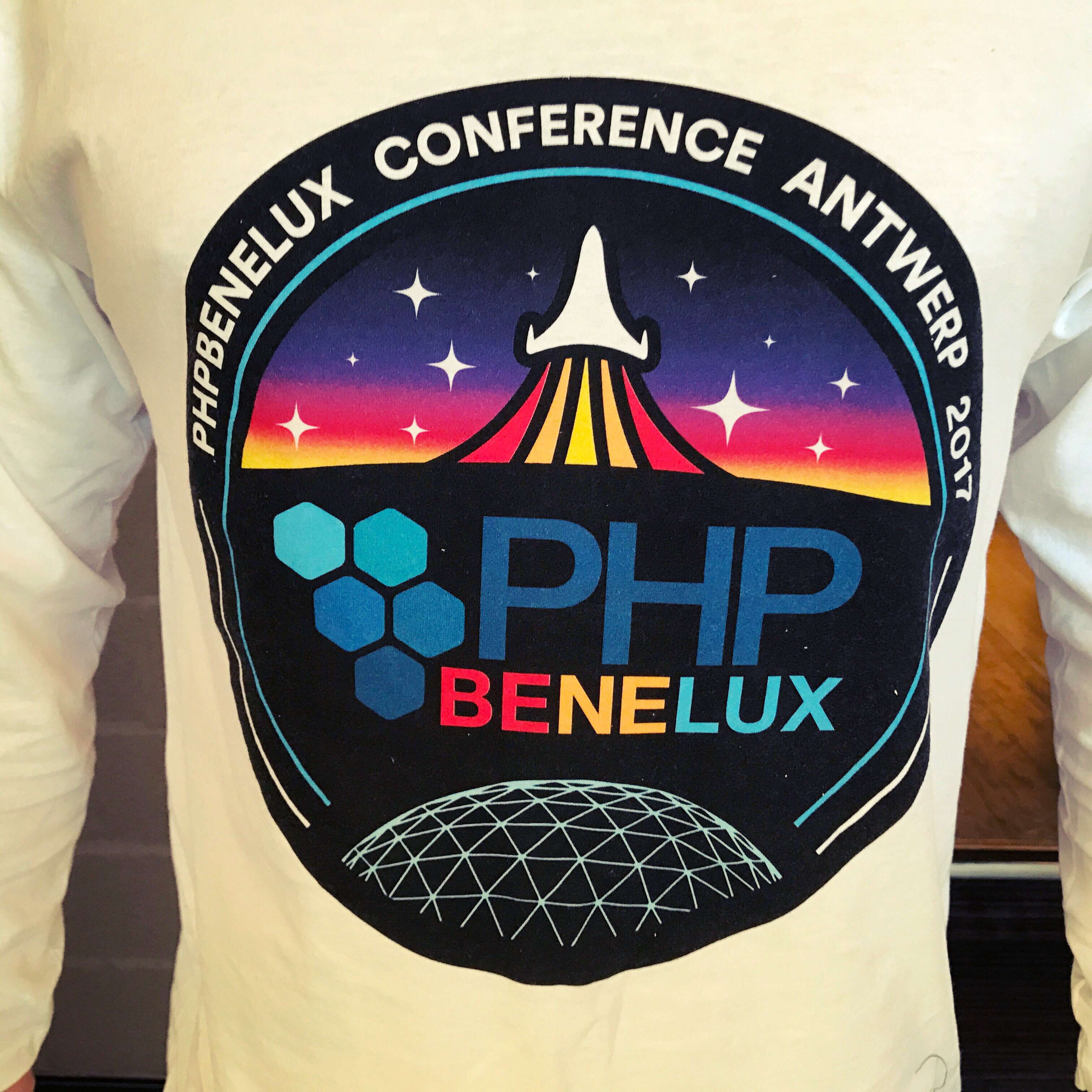
Source: Cogdogblog on Flickr.com
We all live in a connected society using social media to share our thoughts, opinions and funny images of cats. We also post great articles on blogs, forums and all kinds of platforms that allows us to share ideas and knowledge. Some of them are using real graphical artists to make the post more attractive so people would stop by to read more in the future.
One of the oldest ways of sharing was through the use of RDF Site Summary (RSS) – by most people referred to Really Simple Syndication – as a standard to share blog articles or forum posts. A better standard was introduced in years after the introduction of RSS, named Atom Syndication Format or Atom in short and was quickly adopted as the “default” for content syndication or sharing.
Google Reader
Google jumped on this syndication bandwagon when it first introduced Google Reader as a free service in 2005 and had their mail service GMail offering their content also as Atom feed so it could easily be braught into your feeds. As a response, many websites and online services provided RSS and/or Atom feeds in the hopes people would add their feeds into their reader account.
One of the features of this service was that besides offering an online reading experience, it also offered synchronysation for offline readers. This was a huge feature when the iPhone was introduced in 2007 and many “smart phones” followed. Now you could read on-the go and continue where you left off using your browser or a desktop client on your computer.
A bitter side-effect of this syndication was that people no longer visited websites to read content and advertisement agencies complained about the lack of visitors seeing the ads. Services like Feedburner sprung into life to monetize on these syndication feeds and offer in-feed advertisement. A gift from heaven for the advertisement world. Life was great! People got their daily feed of information they were interested in and could catch up with the world in a blazing speed.
Google retired their Google Reader service on July 1, 2013 and after almost two decades of making people familiar with their daily content updates, this retirement came as a shock to many. New services tried to hurry to fill the void the retirement of Google Reader created, but none of them would ever reach the popularity and easyness of Google’s feed manager.
The challange for these online services was not to just offer a way to collect the feeds from various resources, but also to offer a synchronised service so people could read on a variety of devices. Offline readers now had to offer support for a multitude of online feed aggregators and had to make a distinction between free services and premium services. A complex, time consuming and in the end also a financial challange many just couldn’t take any more.
So without a big player in the field of content syndication and the abandoned feed syndication services and applications, this awesome feature is on its way to be doomed for ever. Or maybe not?!?
Current feed syndication services
Online service Feedly.com might be the solution for those who long for a simple, easy to use online service that can be used on any device and is slowly being adopted by many offline syndication applications. Tools like Modern Reader for Microsoft Windows 8, Reeder for Mac OS X and iOS and Feednix for Linux now support Feedly’s services. More apps are listed on Feedly’s app pages.

Source: Feedly.com
Now that we have again a good service in place for syndication of feeds, we can now focus on feeds themselves. Many news agencies still have their feeds in place and people who use blogging software like WordPress, Blogger, LiveJournal or TypePad will keep on publishing their syndication feeds. But the real issue lies with custom application development agencies that build very nice looking, feature rich web sites. They look at any detail but seem to forget the syndication. Why is this?
Make use of your news feeds!
Doing a quick search on the internet for web agencies, out of 10 agency websites only 2 who offered syndication feeds. I guess it’s not a big deal for most agencies to announce to the world what they do, but if you don’t value the power of syndication you miss out on some good stuff. Services like phpdeveloper.org and planet-php.org offer agregation services which means they pick up feeds of trusted sources and distribute it others interested in these sources. A great way to get noticed in the world where your content might get lost in the noise.

Source: PHPDeveloper.org
A good tip for all these web agencies building their own web sites or applications: add some RSS or Atom feed to your creation and enjoy the rich community consuming your feeds. And the good news is, you don’t have to build it yourself as many frameworks offer this functionality out-of-the-box. Just take a look at the following PHP framework components you can use to integrate syndication feeds in your project:
And if you have created your own thing, there’s allways a package available for Composer, like zetacomponents/feed.
Now it is your turn. If you have a web application with changing news, product updates or just a portfolio, ensure you also offer these updates as RSS or Atom feeds. Popular frameworks also offer this service as a core or package component and if you are a true artisan building things from scratch with PHP, Composer is there to help you out.





3 Comments
Hari KT · 18/05/2015 at 10:13
Hi,
Thanks for the article. I have been working on a feedreader, and have played with some of the available packages in PHP and have failed with one or the other due to certain reasons.
Zend Feed is mature but we had some trouble with the Zend Http Client, but you are not limited you can always replace the Zend Http Client with Guzzle Client. If someone needs I have written about it http://harikt.com/blog/2015/04/01/zend-feed-and-guzzle/ . And I am sure PR-7 is going to open new door.
Michelangelo van Dam · 18/05/2015 at 14:10
Hey Harikt,
Yes, I also believe that the new PSR-7 is going to boost the usage of feed syndication. But I also see that more and more tools are adapting the Guzzle approach for doing anything over HTTP. And now with the upcoming changes in Zend Framework 3, we now can use community based components (plugins, packages, bundles or libraries) to enrich our framework. So, a minimalistic approach as you guys did with AuraPHP is what I believe will be the future of frameworks.
That said, it’s also important for web agencies that have regular updates on their products or services, they implement these 3rd-party components to enrich the user experience and benefit from the global aggregation of these updates.
Thanks for sharing.
Hari KT · 19/05/2015 at 04:41
You are absolutely correct.
Thank you
Comments are closed.